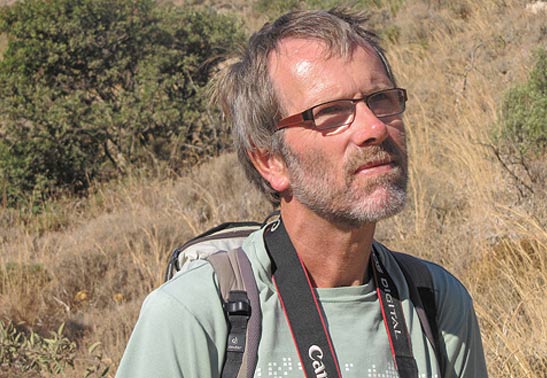What is it really like studying at the University of Cumbria? Read about some of our students' experience doing doctoral research with us.

Neil Windett
Doctoral Study: Health, Value and Green Spaces
Experiencing a ‘free range’ childhood in rural Lancashire of the 1960s and brought up on books by the likes of Gavin Maxwell and Gerald Durrell, Neil has been obsessed with wildlife and countryside conservation for as long as he can remember.
Neil says, "There were no undergraduate degrees on topics such as wildlife conservation in the 1970s, so I gained experience by volunteering and attending courses with the likes of what are now The Conservation Volunteers, Lancashire Wildlife Trust and Royal Society of Biology. My first paid job was teaching biology and environmental science in further education. I was then fortunate to obtain a full time work with The Conservation Volunteers, first in Yorkshire, then in Scotland and later in the South Pennines. Working for The Conservation Volunteers was a great experience and the organisation supported me in studying for a Postgraduate Diploma in Countryside Management."
"I then moved into local government, responsible for the planning, development and management of conservation and countryside recreation in Kirklees Council in West Yorkshire, the 7th largest metropolitan council in the country. This new role was at a strategic level, the ability to successfully secure grant aid and sponsorship being important capabilities. In order to develop the necessary management and leadership skills, in my own time, I studied for a CMS with the Open University and an MBA at the University of Huddersfield."
"My colleagues and I delivered a diversity of programmes and projects, but I’m most proud of those aimed at engaging deprived communities, ethnic minorities, children and young people in the countryside and green spaces."
"Following yet another round of damaging cuts to local government, I decided to opt for early retirement and take up a new challenge. The lure of a PhD had appealed for years, but with a demanding full-time job and family commitments, it wasn’t really feasible. It was obvious to me that the new challenge would be a PhD, but I found deciding the exact subject area surprisingly difficult. Many topics are of interest to me, which can be a problem, when arriving at a decision."
Asked about areas of specific interest, Neil says, "the benefits to society from access to nature, green spaces and the countryside: the concepts of natural capital, green infrastructure and ecosystem services. I’m somewhat fixated with the Lake District and surrounding area being keen on mountain walking, trail running, photography and natural history. What better institution to apply to then than The University of Cumbria? The fact that the University also had the Centre for Wildlife Conservation and the National School of Forestry based at their Ambleside Campus, were significant motivation for me to get in touch."
He says, "The supervisors I met at the university were supportive and keen for me not to get too focused initially, something they have continued to advise while I’ve been researching and writing my literature review. The great advantage of this approach is that it allows you to study a very wide area and you can then focus on what interests you most at a later stage. While researching and writing the literature review, what works best for me is to write something down every day, hopefully something that is intelligible!"
He adds, "The librarians are very helpful and it’s great to have remote access to online journals via one search and a host of other academic research resources."
And his longer term plans?
"In the longer term I’m interested in doing some interesting freelance work. I’ve already experience of teaching, lecturing and training, which it would be good to do more of."

Bel Youngson
Doctoral Study: Occupational Therapy Perspective on Diabetes
Bel completed her PhD – an occupational therapy perspective on diabetes – in May 2016, following a successful viva in February and revision of some minor amendments.
The focus of her research was the role of occupational therapy in self management of diabetes, based on the life context rather than the medical aspects of this condition. Bel says, “I explored the lived experience of diabetes with participants to understand how occupation impacts on and is impacted by diabetes. I explored the use of metaphor as a possible therapeutic medium to improve understanding of people’s experiences of diabetes. In addition I explored the concepts and language of occupational therapy and how these limit or enhance the potential role of occupational therapy in diabetes self-management.”
She adds, “I thoroughly enjoyed the whole process from start to finish and would recommend the fantastic opportunity to think and study that this PhD journey gives you. Thanks go to my supervision team: Professor Diane Cox, Dr Helen Wilby and Fiona Cole for their unstinting support and encouragement.”
Clearly being awarded the PhD is an achievement in itself and Bel was particularly proud of being able to do this in a timely fashion, submitting her thesis within her three year time scale. Additionally, she found having the opportunity to speak at a number of national and international conferences over the three years about the research rewarding. Bel says, “I was successful in being considered for the College of Occupational Therapists (COT) Research and Development Board and have one year remaining as the member responsible for representing the perspective of post-graduate occupational therapy research students UK wide. In addition I was able to advise COT on their professional response to a national Diabetes consultation.”
The whole process can be daunting – how did Bel find it?
“I was fortunate to be able to do my PhD full-time, thanks to a bursary from the University of Cumbria - and a supportive husband. I definitely grappled with the transition from occupational therapy practitioner to researcher in my first year. However there is a very good support network in place: not just the supervision team but also the graduate school sessions, summer school and fellow doctoral students. You do have to work hard but I was able to keep on track by setting regular deadlines with my supervisors and following the PhD timetable received during induction. Before I embarked on the PhD I was advised to study something that really interested and stimulated me – and this was sound advice. It is a great privilege to be able to spend so much time thinking and reflecting on your profession and the various research methodologies.”
Additionally, Bel comments, “Apart from being fascinated by the whole research process I was also fortunate to be able to continue with some undergraduate teaching over the three years on an hourly contract basis. My research into occupational therapy gave me insights into the profession that I was able to share with students. My enthusiasm and passion for the subject resulted in a nomination by students for Lecturer of the Year in 2014, which was a great honour.”
What are her future plans?
“I have been teaching full-time at the university on a fixed term contract since I submitted my thesis in October 2015. From September 2016 I will be teaching part-time (3 days/week) on a permanent contract which allows me 2 days/week to focus on developing my research, and/or spend time on the hill with my husband. Plans are to write further research articles and to find ways to put the research into practice. This will be a new area of practice for occupational therapy and requires careful consideration of the scope of practice, outcome measures, training for occupational therapists and negotiation with commissioners. Hopefully I will also be able to involve students in this on-going research process.”


